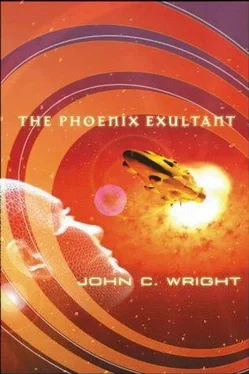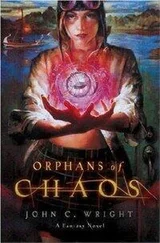And, as the dream ended, he thought he saw, all around him in space, city after city like the one on which he stood, also overwhelmed with black corruption, their populations raped and beheaded by attacking tendrils of neural nanomaterial, their souls sucked out, and sent, like a river of screams, down into the bottomless well of the singularity. Four burning gas giants, their odd atmospheres of hydrogen and methane aflame, fell from their orbits, were pulled like taffy as they fell ever lower into the singularity's gravity well, scattered into asteroids and waste heat, and were consumed.
This star system also had a second sun, a source of light and warmth. It disintegrated into flaming nebula as it fell, elongating into monstrous streamers of fire, as it was consumed by the black sun.
All the energy sources and points of light from the many beautiful cities went dark; all the radio signals, throughout this once-great Oecumene, fell silent.
So the dream had ended.
Phaefhon opened his eyes and stared at the black gloom of the sea around him. He was alone. There was no sign of Old-Woman-of-the-Sea.
To his intense joy, he saw the parts of his golden armor lying in a wide circle around him, resting among the silt and weed and coral. He stood, startling a school of darting fish, and he thought a command. Tendrils reached from the black nanomachine lining he wore, took up the golden plates, and fitted them in place around him.
There was still a throbbing pain in his head, still fatigue. Old-Woman-of-the-Sea had allowed him to sleep, and he could sleep normally hereafter, but he still needed to find a self-consideration circuit, to cure what damage had already been done.
The extent of that damage he did not know.
Where was this place?
He looked up.
Here, at the bottom of a long subsea slope, the end of a trail of debris, Phaethon found his drowned house. It had rolled all the way out of the bay and down this long slope after Ironjoy had scuttled it. There it lay on its side on the rocks, in deep waters where the light was no more than a murky hint.
He climbed the spiral grooves of the toppled house. Phaethon found a spot where a receiving dish had been pulled free from its housing, leaving a comfortable cup for a seat.
He was still weary, still dazed. Sleep had not refreshed him; the damage to his nervous system caused by sleep deprivation needed curing. The joy at recovering his armor, like a fire among dry leaves, had flashed and faded, leaving him dull. Hadn't he been promised the tools he needed to allow him to live? What was here except the wreckage of this house?
No. She said he would live if he thought. Only if he thought.
First, he thought of what he had dreamed.
It was obvious and, perhaps, had always been perfectly obvious who his enemy was.
There had only ever been one colony sent out from the Solar System. Of course that colony was the first suspect. The only problem was that it had perished thousands of years ago, before Phaethon was ever born.
The scenes Phaethon's dream reflected came from scenes in life. During his (brief and reluctant) studies of history, he had seen the last broadcast from the Silent Oecumene; as most people had. He had seen the broadcast showing Earth's only daughter civilization among the stars destroying herself in a paroxysm of insanity.
The faint signal had been detected by orbital trans-Neptunian observatories. No one knew who that viewpoint character had been, who stood wondering on that plain of blood; no one knew whom he had been trying to warn. And no one knew if the broadcast had been fiction, exaggeration, misunderstanding.
Later, Sophotech-manned slow probes, sent despite that they had not enough fuel to decelerate, had done a fly-by of the Silent Oecumene system, using extreme long-range detectors, and had found the same conditions, which the last broadcast had depicted. Deserted space-cities, destroyed planetoids, cold and empty ships, and a residue of blood and black nanoma-terial ash coating all the inner surfaces of every habitat. No energy, no motion, no radio noise. A Silent Oecumene.
Only the fascination, and the hope of an infinite energy supply, had tempted Fifth-Era civilization to the vast expense of an interstellar mission, to explore the area surrounding the black hole at Cygnus X-l. And the first radio-laser broadcasts back from the Second Oecumene (as it had been then called) had been quite favorable. Their society seemed strange to the Sixth-Era generation that received those broadcasts, but the Second Oecumene had achieved great things.
The scientific-industrial teams of the Second Oecumene had discovered a method to send energy-bonded paired particles glancingly through the near-event-horizon space of the singularity, so that the inward particle, consumed by the event horizon, would release into the other particle more energy than had been originally found in the paired system. From the frame of reference of normal space outside the black hole, it was as if entropy had been reversed.
The energy from the escaping particle could be used to create another pair, with energy to spare; the effect fed on itself, producing more and more energy each cycle, with the theoretical limits being only the gravitational rest-energy or the mass of the black hole's singularity. And mass could be added to the singularity simply by dropping more matter into it, asteroids or small planets.
The Second Oecumene's broadcasts had depicted a golden age, as every member had more energy at his disposal than could be counted or conceived. Suddenly, no resources were scarce, and no normal rules of economics applied any longer. There was little or no need for Courts of Law, since there was no common property over which to have disputes. Any object, any habitat, any piece of information, could-with sufficient energy-be duplicated. And the energy was more than sufficient; it was unlimited.
Ironically, it had been the example of the peaceful anarchy of the Second Oecumene which inspired the Golden Oecumene, during the late Fifth Era and early Sixth Era, to imitate that success. The people of the Sixth Era, led by the newly born Sophotechs, attempted to train themselves to such an unprecedented level of self-control and public self-discipline so as to render government by force almost unnecessary. Government by persuasion, by exhortation, largely had replaced it.
Utopia had come not by any magic, or technical advance (although technical advances certainly had helped); it came because the people's tolerance for evil and dishonorable conduct vanished, while their toleration for lack of privacy grew. At one end of the spectrum, the manorials, like Phaethon, were rare only in the high amount of supervision and advice they received from Sophotechs; but at the other and of the spectrum, Antiamaranthine Purists and Ultra-Primitivists and people who had no Sophotechnology in their life at all, or who had never suffered a noetic examination of their thoughts, or a correction of natural insanity, were even more rare-so rare as to be unprecedented. With very few exceptions, then, the Sophotechs in the Golden Oecumene watched everyone and protected everyone.
So it was, at least, in the Solar System. In the Cygnus X-l system, where the Second Oecumene was based, the technology to create self-aware electrophotonic super-intelligences was banned by public distaste. That distant Utopia without laws now had one law it adopted: Thou shalt not create minds superior to the mind of man. By Golden Oecumene standards, the Fifth-Era people of the Second Oecumene were peculiar indeed.
Several thousand years passed. No ships traveled the reach between the two Oecumenes; the distance was too great. And the Second Oecumene, indefinitely wealthy, had no physical goods she needed from the home system. Radio was sufficient to carry messages, information, and the lore of new scientific accomplishments.
Читать дальше











